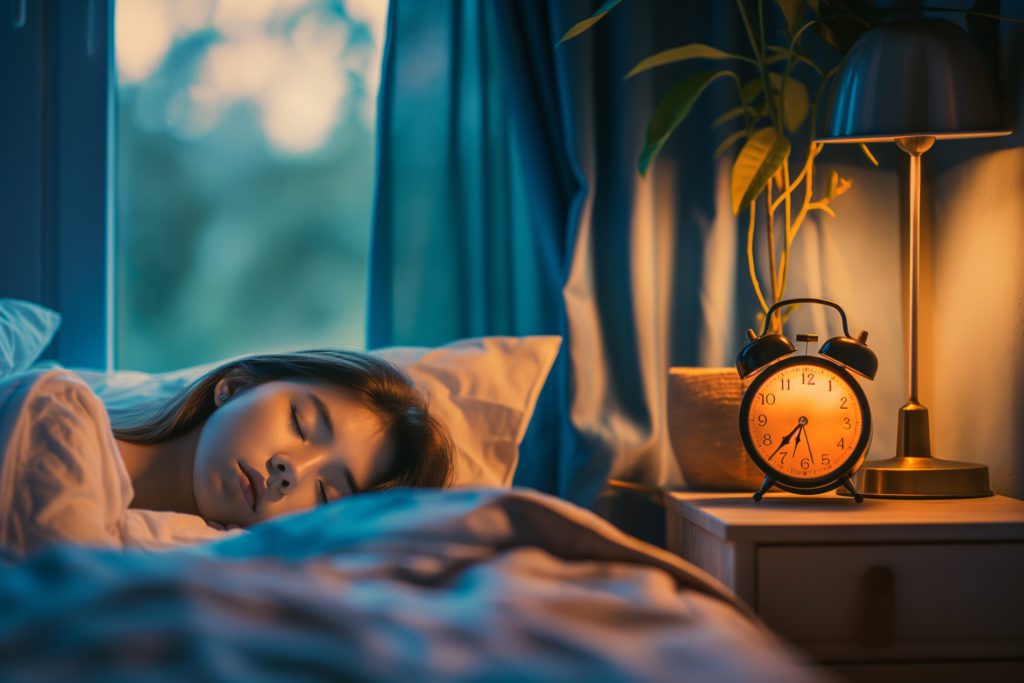
Why Do I Have To Establish A Nighttime Routine?
Are you struggling to fall asleep? Discover how a simple, consistent nighttime routine can improve your sleep quality and overall well-being. Read ahead.

Have you ever found yourself staring at the ceiling, waiting for sleep, only to have your thoughts race uncontrollably? Then, you're not alone. We've all been there, wondering why sleep sometimes feels elusive. But what if I told you that the secret to a peaceful night's sleep lies in something as simple as a bedtime routine?
Sleep is crucial to your overall health, affecting everything from your mood to your memory to how well you function the next day. The key to unlocking better sleep might be establishing a nighttime routine that tells your body when it's time to lie down.
In this article, we will explore why setting up a nighttime routine is essential for everyone and not just for wellness enthusiasts. Whether you're struggling to fall asleep, stay asleep, or wake up feeling like you've slept uncomfortably, a consistent nighttime routine is what you need.
Understanding a Nighttime Routine
A nighttime routine is simply a series of activities you perform regularly before bed that help signal to your brain that it's time to wind down.
Standard components of a nighttime routine include turning off screens, dimming the lights, reading a book, or indulging in a warm bath.
The idea is to create a sequence of events that your brain associates with sleep, making it easier for your body to transition from the chaos of the day to the calm of the night.
However, consistency is critical. Just like you can't expect to get in shape by working out once a month, you can't expect to improve your sleep by only sticking to your routine every now and then.
A study by Kristy Larsen, detailed in a dissertation available through the University of Southern Mississippi, highlights how individuals who maintain a consistent bedtime routine report better sleep quality and fewer sleep disturbances than those who do not. So, while it might seem like a small change, creating a regular nighttime routine can have a big impact on how well you sleep.
The Science Behind Nighttime Routines
It all starts with your brain's internal clock, also known as your circadian rhythm. This natural cycle dictates when you feel awake and when you feel sleepy, largely influenced by external cues like light and darkness. When you establish a nighttime routine, you're essentially setting your internal clock to bedtime mode.
One of the major players in this process is melatonin, often referred to as the sleep hormone. Melatonin levels naturally rise in the evening, signaling to your body that it's time to sleep. However, our modern lifestyles—bright screens and irregular schedules—can throw this process off balance. Therefore, sticking to a consistent routine helps regulate melatonin production, making it easier to fall asleep and stay asleep.
A study published in the ACSM's Health & Fitness Journal found that people who engage in relaxing activities before bed—like reading or meditating—experience higher levels of melatonin compared to those who engage in stimulating activities like watching TV or scrolling through social media.
Additionally, following a regular nighttime routine can reduce the time it takes to fall asleep and improve sleep efficiency, which is the percentage of time you spend asleep while in bed.
Research indicates that individuals with established nighttime routines fall asleep faster and report higher overall sleep quality.
So, not only are you falling asleep more quickly, but you're also getting better sleep.
Your nighttime routine acts like a cue for your body, helping it recognize when it's time to wind down. This conditioning process can significantly improve your sleep quality over time, leading to more restorative sleep and a better mood the next day.
How to Establish an Effective Nighttime Routine?
Don't worry. You don't need a life coach or a personal guru—just a bit of planning and consistency.
Examine Your Current Routine
Are you guilty of falling asleep with your phone in hand or catching up on work emails late into the night? Then, it might be time to rethink those habits.
Start small. You don't need to overhaul your entire evening in one go. Maybe start by setting a regular bedtime or reducing screen time to an hour before bed. Small changes like these can make a big difference over time.
Relaxation Techniques
Deep breathing exercises, meditation, or even light stretching can help signal to your body that it's time to sleep. A study published in the Annals of the New York Academy of Sciences found that mindfulness practices before bed can improve sleep quality by reducing stress and anxiety levels. So, if you find your mind racing at night, consider adding a short meditation session to your routine.
Be Consistent With Your Routine
Try to stick to your routine, even on weekends. It's tempting to stay up late and sleep in, but this can throw off your circadian rhythm and make it harder to fall asleep during the week. Your body thrives on routine, and sticking to a consistent sleep schedule is one of the best ways to ensure you're getting the rest you need.
Your Routine Should be Unique
What works for your best friend or that wellness influencer you follow might not work for you. Tailor your nighttime routine to suit your preferences and lifestyle. Whether it's a cup of herbal tea, a warm bath, or some quiet reading time, make sure your routine feels like a treat rather than a chore. After all, this is your time to unwind and prepare for a good night's sleep.
To take your sleep to the next level and gain valuable insights into your sleep patterns, consider using Pillow—an easy, effective way to track your progress and ensure you get the restorative sleep you deserve.
The Takeaway
In a world where we're constantly on the go, establishing a nighttime routine is what you need for better sleep. It's not about adding more to your to-do list—it's about creating a space where your body and mind can unwind and prepare for rest.
So, tonight, why not start? Turn off those screens, dim the lights, and give your brain the signal it's been waiting for: it's time to sleep.

Written by
Dr Aqsa
As a Medical Doctor, Dr Aqsa, uses her knowledge to craft complex medical information that is understandable to the general public. For years, she has tried to improve health literacy and empower readers with valuable health knowledge through her articles, blog posts, and educational materials.
Download Pillow
Get help
Press & News
Legal
Connect
X (Twitter)
Company
Copyright © Neybox Digital Ltd.



